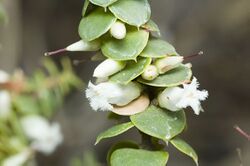Biology:Leucopogon cordifolius
| Leucopogon cordifolius | |
|---|---|

| |
| In the Australian National Botanic Gardens | |
| Scientific classification | |
| Kingdom: | Plantae |
| Clade: | Tracheophytes |
| Clade: | Angiosperms |
| Clade: | Eudicots |
| Clade: | Asterids |
| Order: | Ericales |
| Family: | Ericaceae |
| Genus: | Leucopogon |
| Species: | L. cordifolius
|
| Binomial name | |
| Leucopogon cordifolius Lindl.[1]
| |
| Synonyms[1] | |
|
Styphelia cordifolia (Lindl.) F.Muell. | |
Leucopogon cordifolius, commonly known as heart-leaved beard-heath,[2] is a species of flowering plant in the heath family Ericaceae and is endemic to Australia. It is an erect shrub with broadly egg-shaped to round leaves, and white, tube-shaped flowers, the petals bearded on the inside.
Description
Leucopogon cordifolius is an erect shrub that typically grows to a height of 0.8–1.5 m (2 ft 7 in–4 ft 11 in) and has softly-hairy branchlets. Its leaves are broadly egg-shaped to round, 3.5–7 mm (0.14–0.28 in) long and 4–8 mm (0.16–0.31 in) wide and curve downwards with a short bristle on the tip. The flowers are arranged in spikes 5.5–8.5 mm (0.22–0.33 in) long in leaf axils, each spike with up to three flowers with broadly egg-shaped to round bracteoles 1.8–2.3 mm (0.071–0.091 in) long at the base. The sepals are egg-shaped, 3–5 mm (0.12–0.20 in) long, the petals white and joined at the base to form a tube 2.8–4.1 mm (0.11–0.16 in) long, the lobes 2.4–2.8 mm (0.094–0.110 in) long and bearded on the inside.[2][3]
Taxonomy
Leucopogon cordifolius was first formally described in 1838 by John Lindley in Thomas Mitchell's journal, Three Expeditions into the interior of Eastern Australia.[4][5] The specific epithet (cordifolius) means "heart-leaved".[6]
The National Herbarium of Victoria and Western Australian Herbarium give the name Styphelia cordifolia.[3][7]
Distribution and habitat
Heart-leaved beard-heath grows in the understorey of woodland and in heathland in the far north-west of Victoria, the south-east of South Australia, and disjunctly in the Carnarvon, Geraldton Sandplains, Yalgoo bioregions in the west of Western Australia.[2][3][7]
References
- ↑ 1.0 1.1 "Leucopogon cordifolius". https://biodiversity.org.au/nsl/services/apc-format/display/98539. Retrieved 7 June 2022.
- ↑ 2.0 2.1 2.2 "Leucopogon cordifolius". State Herbarium of South Australia. http://www.flora.sa.gov.au/cgi-bin/speciesfacts_display.cgi?form=speciesfacts&name=Leucopogon_cordifolius.
- ↑ 3.0 3.1 3.2 Walsh, Neville G.. "Styphelia cordifolia". Royal Botanic Gardens Victoria. https://vicflora.rbg.vic.gov.au/flora/taxon/f95bb514-2e3e-4870-93d0-e080c358a681.
- ↑ "Leucopogon cordifolius". APNI. https://id.biodiversity.org.au/instance/apni/524557. Retrieved 7 June 2022.
- ↑ Mitchell, Thomas L. (1839). Three expeditions into the interior of eastern Australia (Second ed.). London. p. 122. https://www.biodiversitylibrary.org/item/253696#page/150/mode/1up. Retrieved 7 June 2022.
- ↑ Sharr, Francis Aubi; George, Alex (2019). Western Australian Plant Names and Their Meanings (3rd ed.). Kardinya, WA: Four Gables Press. p. 170. ISBN 9780958034180.
- ↑ 7.0 7.1 "Styphelia cordifolia". FloraBase. Western Australian Government Department of Parks and Wildlife. https://florabase.dpaw.wa.gov.au/browse/profile/49789.
Wikidata ☰ {{{from}}} entry

